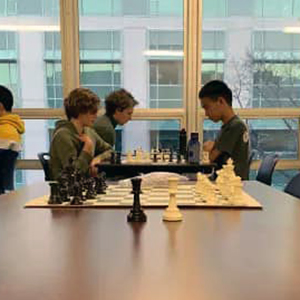Several times each month, chess players from ∫⁄¡œ≥‘πœÕ¯have been visiting local senior residences for some friendly competition. But the students say their time spent at these communities means a lot more than just a game of chess ‚Äî for both them and the residents.
The opening move
The idea for Chess for Brain¬Ýwas sparked last summer and was spearheaded by Jamil Muradov, a PhD student in Dal‚Äôs Faculty of Medicine, along with undergraduate chemistry student Jonathan Choi and Dal medical student Roxaneh (Roxana) Zaminpeyma. They are all members of the¬Ý.
Community engagement is key to the club's mandate ‚Äî it's not just about supporting chess players and growing the game at Dalhousie, but providing ways for anyone in Halifax and beyond to connect through one of the world's most beloved strategy games.¬ÝThe club proposed the idea of partnering with local communities such as long-term care homes and, so far, it has been a checkmate.
“There’s research showing that chess is beneficial for the development of memory and the retention of brain health, which was at the core of our proposal,” says Jamil.
Jamil, who researches traumatic brain injuries in the Department of Medical Neuroscience, currently serves as the club’s health community representative.
“Anyone can play chess regardless of the amount of time that they have spent practicing different chess techniques and openings," he says. "So even at sort of the simplest level, even if played as a recreational game it’s still able to invoke, or put to use, some of the brain’s attention and focus mechanisms.”
A different kind of exercise¬Ý
By volunteering their time, chess players from Dal are hoping provide seniors with an opportunity to exercise their brains and either learn a new skill, or square off against equally advanced players.
“Some of the students got to teach interested seniors how to play chess basically from zero, since they had never done that before," says Jamil. "Or, they actually found some pretty good, strong opponents there and were able to practice their skills with them.
Jamil says the club has a pool of around 15-20 volunteers who sign up monthly to visit various senior residences around Halifax. For both the seniors and the students, it provides an opportunity to make connections outside of the game of chess.
The social side
“It’s more about the socialization aspect and getting to know about the life stories of these people,” says Jamil. But that goes both ways. While the residents of the senior living communities get to exercise their brains, students can receive some wisdom as they look towards post-university life.
 “Us, as aspiring professionals in different fields ranging from medical sciences to engineering to humanities, studying different subjects here at Dal, could take in to account the perspective that these wise people have and carry it forward."
“Us, as aspiring professionals in different fields ranging from medical sciences to engineering to humanities, studying different subjects here at Dal, could take in to account the perspective that these wise people have and carry it forward."
In addition to Chess for Brain, Dal’s Chess Club holds seminars, socials, and weekly meetups for chess players to practice their skills. The club also hosts around eight tournaments per year, all open to the local community.
Society President¬ÝRikuto Nakayasu is a student in Dal‚Äôs Mechanical Engineering program. He hopes the society can serve as a welcoming introduction to the game of chess for students who want to give it a try.
“Chess is for everyone,” says Rikuto. “I think many people dismiss it as something that they’re not smart enough to do. I think chess is for everyone and you don’t know if you’re going to like it until you try it.”
Connect with the ∫⁄¡œ≥‘πœÕ¯Chess Club on¬ÝÃ˝≤π≤‘ªÂÃ˝.

